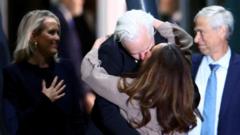Julian Assange, the founder of Wikileaks, has arrived back in his native Australia after reaching a plea deal that allowed him to walk free from a London prison. The emotional scenes at Canberra Airport witnessed Assange kissing his wife, Stella, and embracing his father, while his lawyers watched on, visibly moved. Stella Assange spoke on behalf of her husband at a subsequent news conference, stating that Julian needs time to recover and adjust to his newfound freedom.
Assange, who has been embroiled in a legal battle with US officials for the past 14 years, was accused of leaking classified documents that allegedly endangered lives. The 52-year-old did not attend the news conference, leaving his lawyer and wife to address the media. Stella Assange emphasized the need for understanding regarding what her husband has endured, expressing the desire for their family to have time to reconnect.
The couple, who married in London’s Belmarsh prison in 2022, have two children together. The plea deal saw Julian Assange plead guilty to one charge of conspiracy to obtain and disclose national defense information, a significant reduction from the original 18 charges he faced. The case revolved around a massive Wikileaks disclosure in 2010, which included a video showing civilians being killed in Baghdad by a US military helicopter. Additionally, thousands of confidential documents were published, suggesting unreported incidents of civilian casualties during the war in Afghanistan. These revelations sparked global attention and scrutiny of American involvement in foreign conflicts.
Assange formally entered the plea on the remote Northern Mariana Islands, an American territory in the Pacific, two days after leaving Belmarsh prison. As part of the deal, he was sentenced to time already served and released to return home. His lawyer, Jen Robinson, condemned the plea deal as a “criminalization of journalism” and warned of the dangerous precedent it sets. Stella Assange echoed these concerns, hoping that the media would recognize the implications of this conviction for newsgathering and publishing information in the public interest.
Robinson also revealed details of a phone call between Assange and Australian Prime Minister Anthony Albanese, who played a crucial role in securing his release. According to Robinson, Assange told the prime minister that he “saved his life,” a statement she deemed not an exaggeration. Albanese held his own news conference, expressing his satisfaction that the case has concluded and acknowledging the considerable ordeal Assange has endured. While the prime minister acknowledged his disagreement with some of Assange’s actions, he emphasized that it was time for his release, making the case a priority.


1 Response
I remember when Julian Assange first made headlines with the release of classified documents through Wikileaks. It was a time of controversy and intrigue, as the world was captivated by the revelations brought forth by Assange and his team.
I was a college student at the time, studying journalism, and the impact of Wikileaks on the media landscape was undeniable. It sparked a debate about the role of whistleblowers and the responsibility of journalists to expose government secrets. Many praised Assange for his commitment to transparency and holding those